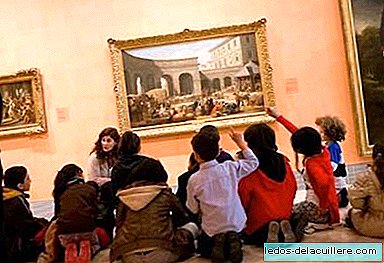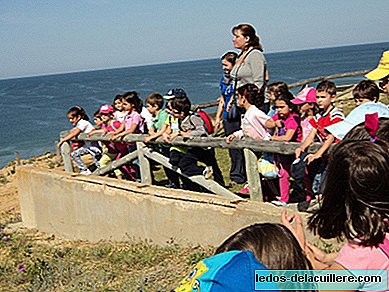On many occasions for parents the video game They are a source of worry or "fight," something that leads to conflict with children (time spent, type of game, etc.). However, in addition to reporting Benefits For kids, video games can become our allies and even help improve the relationship with our children.
Benefits of video games
Much has been written about the use and abuse of video games by children, as well as the negative effects that this can have, however, not everything is darkness in this subject. More and more studies corroborate the benefits of videogames on children's development (as long as it is used rationally and with supervision, of course). Let's see some of them:
- Improvement of visospatial skills: better ability to handle objects in three dimensions, which has implications in areas such as mathematics, technology, science ...
- Promote social interactions, and not exclusively in 2.0 environments as one might think, but also in “live”: video games are a topic of conversation and therefore of connection (sharing strategies, tricks, etc.), in many cases they are group games ( more than one player) in which teamwork is also enhanced, etc.
- Greater ability to concentrate: playing with video games improves sustained attention, which translates into a greater concentration on the task (and for longer).
- Alternative reality games (ARGs) enhance critical thinking, resilience and creativity in the problem solving (capacities that result in a better development of, among others, mathematical skills).
- Creativity: Children who play video games seem to be more creative in areas such as drawing or literary creation.
- Video games are effective tools to strengthen the ability to face the failure, which helps better control of emotions, better tolerance to frustration and stronger self-esteem.
- They can contribute to reduce anxiety and stress, as noted by the American Psychological Association.
- Improvement of motor skills: For example, a study by Deakin University in Australia indicates that children who play video games show greater control in actions such as kicking, catching and rolling a ball.
- They provide a context of individualized and personalized learning: It is the child, in the game, who sets the pace based on his learning and abilities, unlike certain "impositions" that sometimes occur in other contexts such as school.
- There are videogames about science, history ... The format itself invites learning, it encourages kids to develop curiosity about these issues.
For more information on the multiple benefits of video games in children you can consult the detailed review conducted by the American Psychological Association.

Video games as a point of union, not conflict
Contrary to what videogames might seem, they do not necessarily take us away from our children or isolate them from us, but for this not to happen, it is necessary that, as in so many other things, parents get involved and participate in this reality.
Sharing hobbies, in this case video games, is a great way to strengthen ties with our children and spend time with them. In fact, a study conducted by the University of Arizona indicates that sharing this activity favors family ties, learning and well-being.
Participating in these activities with our children also favors that we have a greater knowledge of what they spend their time, something fundamental. It is not "Ah, you are playing the console", it is knowing what game, to have bought it with him / her (and therefore to have ensured that it is appropriate) ... All these things are a point of union with the children.
On the other hand, sometimes it is difficult for parents to communicate with our children, it is difficult to "tear" something that is not a monosyllable. Video games, if you are interested, of course, can be a great conversation topic Of which they sure have something to say.
Play with your son
Beyond pure leisure, sharing time "playing the console", together, can become a "teaching-learning" window great that we can use to address and work certain issues:
- Cooperation: having a common goal, an objective, favors teamwork. Take the opportunity to establish alliances with your child and convey the feeling of team (then you can extrapolate it to other areas).
- Management of frustration and the value of effort: Is the bad guy done with us seventy times? Do those objects we need seem impossible to achieve? Sometimes it costs a lot to move to the next level or get the objects we need to move forward, this is an ideal scenario to work with the child tolerance to frustration as well as the importance of perseverance and the effort to achieve our goals.
- Use the game as a metaphor: the plot or some complication that has arisen can be the perfect excuse to talk about real-life issues through fiction and vice versa (explain certain situations of reality through the metaphor of the game): this language will facilitate them compression and internalize the message.
- Feel like an expert: admit that we are not all familiar with consoles, controls, games ... Participating with our children, asking them to teach us to play, puts them in "expert position", makes them see that they can also teach us something , which powers your self esteem and his perception of self-worth.
- Are you stressed or tired? And your little one? Playing with certain video games can produce a relaxing effect and reduce stressSo, if you have a complicated day, sharing a little leisure time can be useful for everyone.
- A study carried out by the Education Development Center of the United States highlights that the use of video games in education improves reading-writing skills in preschoolers when it is associated with a high involvement and participation of parents in these games.
- Parents who regularly play video games (with and without their children) extract and further enhance their benefits on the development of their children.

As it happened years ago with television, the recommendations for a good use of new technologies in general, and video games in particular, involve getting involved as parents, knowing what our children consume, setting the guidelines and, as we have seen, participating with They of this activity. The console can be a nefarious babysitter or a great learning tool. Take control and play with your son.
Photos: Pexels.com, uk.playstation.com, JD Hancock (Flickr)
In Babies and more: Minecraft: Learning with a video game, the dream of many children getting easier












